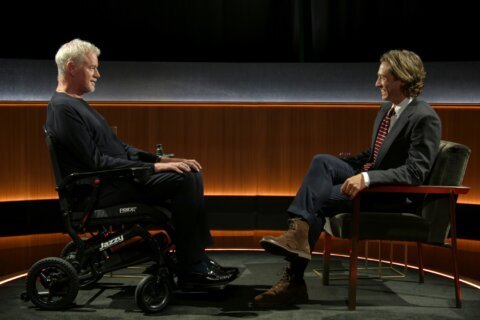Last week, AMC Theatres announced a new tiered ticketing system based on seat location, charging different amounts for “value” vs. “premium” seats.
Under the new plan, moviegoers can pay more for middle seats with better views, less for seats in the front row, or the current “traditional” price for all other remaining seats.
Both the AFI Silver Theatre in Silver Spring, Maryland, and the Avalon Theatre in D.C.’s Chevy Chase neighborhood tell WTOP that they have no plans to mimic AMC’s new tiered pricing plan. However, Avalon Director of Programming Andrew Mencher understands AMC’s logic and hopes that moviegoers will consider the context before complaining.
“I don’t know if they should be outraged,” Mencher said. “It’s a natural extension of what other performing arts and sporting venues do already: you have some seats that are more expensive. It is somewhat logical that a movie theater chain would take this approach. … Some people love to sit close to the screen, so hopefully those folks get a discount.”
Like any change to a business model, there are always pros and cons.
“Lord of the Rings” star Elijah Wood tweeted his outrage: “The movie theater is and always has been a sacred democratic space for all and this new initiative by AMC Theatres would essentially penalize people for lower income and reward for higher income.”
The movie theater is and always has been a sacred democratic space for all and this new initiative by @AMCTheatres would essentially penalize people for lower income and reward for higher income.
— Elijah Wood (@elijahwood) February 6, 2023
On the flip side, if audiences have to pee during Frodo’s four-hour film, front-row patrons would have quicker access to the bathroom, as well as the concession stand and parking garage without needing to arrive early to claim a prime seat and sit through trailers.
Many theaters, including The Avalon, had already switched to assigned seating, an idea that began well before the COVID-19 pandemic but was increasingly solidified during recent pandemic restrictions when viewers were required to sit at least six feet apart.
“The Avalon had been general seating all before the pandemic, but we needed a new box-office approach to separate our patrons for health reasons,” Mencher said. “There’s a big advantage to assigned seating: people know where they’re gonna be, they can buy that exact seat and they don’t have to get there 30 minutes ahead of time and wait in line.”
The movie theater industry has been struggling to recover from the double whammy of the pandemic and streaming, which have driven many viewers to watch movies at home.
“During the pandemic is when Disney+, HBO Max started,” Mencher said. “Yeah, there was Netflix and Hulu, but the other film distributors came up with their own platforms during the pandemic, so it was a serious one-two punch all at the same time. A lot of people are learning how to stream and the ease with doing that. … You really can’t stop progress.”
The seismic shift has landed Regal Cinemas in bankruptcy, forcing it to close theaters, including popular local multiplexes at Gallery Place in D.C. and Rockville, Maryland.
“We may have been over-screened prior to the pandemic — this might be a correction, to some extent,” Mencher said. “For the three years right before the pandemic — 2017, 2018, 2019 — each one of those years was averaging about $11.4 billion, then last year in 2022, industry-wide was around $7.4 billion. So we’re still running at about 65% of normal.”
As a nonprofit organization, The Avalon has a much different business model than chain theaters, such as AMC Theatres, which operates roughly 950 movie theaters nationwide.
“Our specialty is playing stuff that is harder to find, movies that are independent, foreign, smaller-scale for older, adult audiences,” Mencher said. “The Avalon has one of the absolute best grosses on ‘The Fabelmans’ within the United States of America — I think we’re Top 10, and we’re No. 1 in the Washington-Baltimore-Richmond-Mid-Atlantic region.”
In the end, he tries to remain hopeful but realistic about the future of moviegoing.
“I remain optimistic that there is always a place for the movie theater, the experience of going to a dark theater with other people and experiencing something all together at the same time. I think there is something magical about that, but it would be dishonest to say there aren’t a lot of challenges ahead,” Mencher said.
Listen to our full conversation here.








